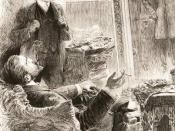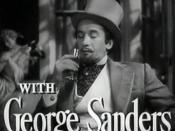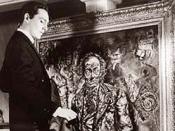"Hedonism"
By Jessica Shelby
Oscar Wilde'sThe Picture of Dorian Gray is a prime example of hedonism, a movement in the late 1800's that claims pleasure to be the prime goal in one's life. The focus of the novel is the beauty of Dorian Gray, his self-destructive search for pleasure, and the corruption of both the lives he has encountered and his own soul. Beauty and pleasure are the focus of all characters and scenes depicted in The Picture of Dorian Gray. Wilde's timeless novel vividly portrays the hedonism ideals as the theme of the Picture of Dorian Gray with its characters' mentality, roles, and eventual demise.
The hero of the novel, Dorian Gray, is introduced as an innocent, beautiful young boy until he-in a mad instant- prays that his beauty shall live on while his portrait bares the resemblance of his shame and disgrace. Basil Hallward, the painter of the doomed portrait, praises Dorian for his timeless beauty and innocence.
Basil is obsessed with Dorian, and his pleasure is found with the ideal of Dorian that allows him to paint so elusively. The corruption of Dorian begins with Basil's adoration, but it is lofted with Lord Henry's hedonistic ideals and all around negative influence. Lord Henry teaches Dorian to cherish his youth and beauty, all the while filling Dorian's mind with selfish ideals of pleasure and beauty.
"I believe that if one man were to live out his life fully and completely, were to give form to every feeling, expression to every thought, reality to every dream- I believe that the world would gain such a fresh impulse of joy that we would... return to Hellenic ideal- to something finer, richer, than the Hellenic ideal." With musings such as this, Lord Henry begins his takeover of young Dorian's...



Oscar Wilde
An amazing novel - you could have written much more about this incredible book, especially considering that you are in the twelfth grade. However the content is good, though minimal.
2 out of 2 people found this comment useful.